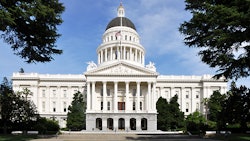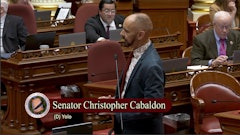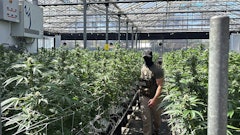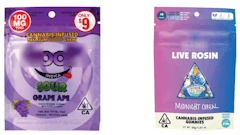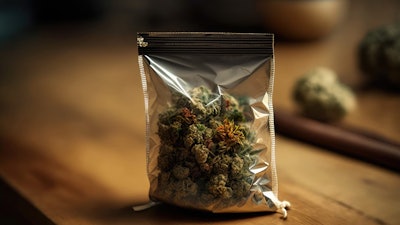
California Gov. Gavin Newsom vetoed a bill Oct. 8 that aimed to ban state-licensed cannabis companies from using real or fictional humans, fruits and vegetables, or mythical creatures on their packaging and marketing.
The legislation, Assembly Bill 1207, would have rendered a significant percentage of cannabis products as noncompliant throughout California, essentially crippling many small businesses and costing others as much as six figures to redo their branding. For many cultivators, rebranding in this fashion means disconnecting from their personal stories and generational legacies.
While the author of the bill, Assemblymember Jacqui Irwin, D-Thousand Oaks, argued the legislation was meant to adequately protect children from exposure to the cannabis industry, Newsom said he didn’t see it that way despite the good intentions of the bill.
“While I deeply appreciate and agree with the author’s intent, I am concerned that the definition of ‘attractive to children’ used in this bill is overly broad,” Newsom said Sunday in his veto message. “By prohibiting entire categories of images, this bill would sweep in commonplace designs, and I am not convinced that these additional limits will meaningfully protect children beyond what is required under existing law.”
This executive authority to keep the California Legislature in check was an act that hundreds of industry stakeholders have urged Newsom to take since the bill passed Sept. 14 with an 84% majority in the Assembly and 57.5% majority in the Senate.
Lindsey Renner, owner of Native Humboldt Farms, told Cannabis Business Times last month that she estimated more than 1,500 letters opposing the bill had been sent to the governor’s office. Not only does Renner grow fruits and vegetables on her farm, but part of her brand story is in fact herself: a Native American woman who now grows cannabis on the very land that belonged to her Wailaki Tribe members who were enslaved and forced to relocate during white incursion in the mid-1800s.
Renner, a very real human with a very real story, would have been prevented from using herself in branding, including marketing on social media, where she regularly shares photos of herself with her plants on her native land.
“For me, as a legacy grower, my entire company and my brand identity has been formed around me, life on my farm and my interaction with the plant,” Renner said.
RELATED: ‘Every Brand Is Up in Arms About This’
Dubbed the “Cannabis Candy Safety Act” by proponents—notably by Getting it Right From the Start, a self-described public health group—A.B. 1207 attempted to define the term “attractive to children” in the realm of the state’s cannabis industry. The bill’s language intended to expressly prohibit the manufacture, distribution and sale of cannabis or cannabis-related products that are attractive to children.
But the bill’s definition of “attractive to children” extended well beyond the limits of banning any imitation of candy, cartoon characters or images that are popular among children on the packaging or labeling of cannabis products, according to opponents.
And until Newsom issued his veto statement Oct. 8, it was unclear what stance he’d take on the bill given his previous decisions related to advertising for the industry.
Notably, in 2021, Newsom vetoed legislation that would have allowed cannabis products to be advertised on billboards along interstate freeways, except within 15 miles of another state. He specifically mentioned shielding youth from exposure to cannabis and cannabis advertising in his veto message that year.
Hirsh Jain, founder of Ananda Strategy, a consultancy that represents many of California’s cannabis retailers and advises operators across the supply chain, said that the 2021 veto blindsided the cannabis industry at a time when Newsom was campaigning for re-election.
“In that instance, Gov. Newsom concluded that it would be politically disadvantageous to ally himself with the cannabis industry over ‘public health groups,’ even if those groups continued to recycle many of the myths about cannabis that undergirded the failed policy of cannabis prohibition,” Jain told CBT.
This time around, on A.B. 1207, Newsom stood up on the industry’s behalf, Jain said.
When voters in 2016 passed Proposition 64, the ensuing Medicinal and Adult Use Cannabis Regulation and Safety Act (MAUCRSA) that was enacted provided “robust protections” shielding those under 21 years old from exposure to cannabis and cannabis-related products, Newsom said in his Oct. 8 veto message.
In addition, the state’s Department of Cannabis Control has established regulations that safeguard children from cannabis marketing, he said. However, the governor did indicate these safeguards could be strengthened in a manner that doesn’t impede on licensed cannabis company’s ability to do honest business.
“California must continue to refine and advance its regulation of cannabis to protect the health and safety of children,” Newsom said. “As such, I am directing the Department of Cannabis Control to strengthen and expand existing youth-related cannabis protections—including measures to enhance enforcement of those protections.”
In California, a two-thirds vote in each house of the state Legislature is needed to override a governor’s veto.











